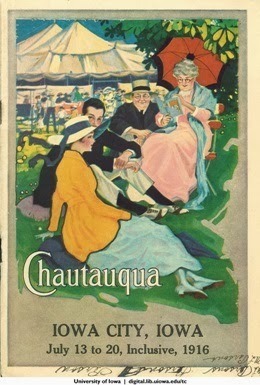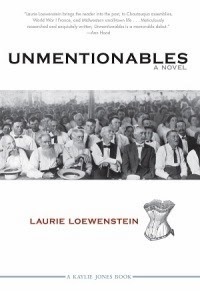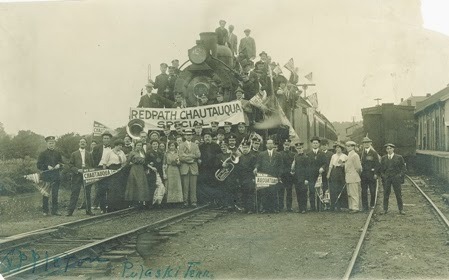Going Down the Line: A guest post by Laurie Loewenstein, author of Unmentionables
Please help me welcome Laurie Loewenstein to the blog today. Her original essay about Circuit Chautauqua, which features in her historical novel Unmentionables (out today in trade paperback), has piqued my interest in this unique form of itinerant entertainment and cultural education; I'm tempted to travel to see one of its modern re-enactments next summer. Hope you'll enjoy her post!
~
Going Down the LineLaurie Loewenstein
Even before the first chords of “The Indian Love Call” are struck by five Filipino musicians, the air under the brown canvas tent is electric. Farm families and townsfolk alike have waited all year for this moment, and now the opening salvo has been launched with a vigorous strumming of mandolins, banjos and guitars. Hundreds of palm fans flutter against the oppressive afternoon heat as the audience readies itself for a week of edification, culture and entertainment.
 From 1904 to the late 1920s, networks of orators, singers, humorists and orchestras toured the rural areas of the Midwest, South and West, in what became known as Circuit (or Traveling) Chautauqua. In 1924, when the phenomenon was at its peak, it is estimated that more than 40 million people attended a Chautauqua performance. Theodore Roosevelt famously called it “The Most American Thing in America.”
From 1904 to the late 1920s, networks of orators, singers, humorists and orchestras toured the rural areas of the Midwest, South and West, in what became known as Circuit (or Traveling) Chautauqua. In 1924, when the phenomenon was at its peak, it is estimated that more than 40 million people attended a Chautauqua performance. Theodore Roosevelt famously called it “The Most American Thing in America.”
While rural citizens took a week away from the demands of farm and shop to bask in the rhapsody of chiffon-gowned sopranos, the mystery of illusionists and the allure of intrepid adventurers, it was the orators who reigned over the platforms. In his loose alpaca coat and with one hand on a block of ice to cool himself, William Jennings Bryan sweated out his famous “Cross of Gold” speech to as many as 30,000 people a night as he crisscrossed America’s heartland.
The handsome, silver-haired Lieutenant Governor of Ohio, Warren G. Harding, exuding small-town charisma, charmed Chautauqua audiences for decades with his discourse on Alexander Hamilton. Even after he was elected senator, Harding continued to step onto Chautauqua stages under the sweltering canvas. Harding’s open-hearted friendliness and soaring baritone trumped his critics, including H.L. Mencken who remarked that Harding’s words were nothing more than “a string of wet sponges.”
 Formidable women lecturers, part of the rising tide of reform in the early 20th century, held forth on hundreds of Chautauqua platforms during these years. Jane Addams of Hull House fame, Ida Tarbell, a leading muckraker famous for her expose on Standard Oil, and suffragist Anna Shaw all took the stage at one time or another. Maud Ballington Booth, billed as the “Mother of Prisons,” spoke unceasingly about appalling conditions in British and American penitentiaries.
Formidable women lecturers, part of the rising tide of reform in the early 20th century, held forth on hundreds of Chautauqua platforms during these years. Jane Addams of Hull House fame, Ida Tarbell, a leading muckraker famous for her expose on Standard Oil, and suffragist Anna Shaw all took the stage at one time or another. Maud Ballington Booth, billed as the “Mother of Prisons,” spoke unceasingly about appalling conditions in British and American penitentiaries.
It was within this charged atmosphere of forthright orators, both male and female, that I imagined the fictional Marian Elliott Adams would take her place in my novel, Unmentionables. Marian, an activist for women’s dress reform, undertakes the grueling itinerary of nightly performances in small towns dotting the midlands in order to win converts to the loose tunics (sans corsets) that she advocates.
I was fortunate to find a wealth of digitized materials documenting Circuit Chautauqua compiled by the University of Iowa. Examining the multi-page program booklets passed out to every subscriber and the pamphlets distributed by hundreds of individual performers, I was able to re-imagine the world in which Marian moved. “Going down the line,” as regular Chautauqua talent called it, was not for the faint of heart. Many endured long train rides from one small town to the next over many consecutive nights. They learned to catch naps, as William Jennings Bryan did, on wooden benches with iron armrests for pillows. The heat under the tents was famously intense. Hail storms at times ripped holes in the canvas, but the orators did not drop a syllable.
 Source for photos: University of Iowa; reprinted with permission.
Source for photos: University of Iowa; reprinted with permission.
Traveling Chautauqua disappeared in the early 1930s, a fatality of the radio, which connected the isolated hamlets of America in ways the Circuit never could. Chautauqua, however, lives on. The Chautauqua Institute, the progenitor of the Circuit, continues its mission to provide ongoing adult education of the highest quality as it has since 1874. Beginning in 1904, the commercial booking agencies adapted the Institute’s format to create Circuit Chautauqua. Additionally, Humanities Councils in several states, including Ohio, Maryland and Nebraska, now mount summer Chautauqua events featuring historical impersonators.
In these ways while Circuit Chautauqua performers no longer “go down the line,” their voices and music still ring across the years.
~
Laurie Loewenstein’s Unmentionables was published by Kaylie Jones Books, an imprint of Akashic Books, in January 2014 ($15.95, trade pb, 320pp). Visit the author’s website at laurieloewenstein.com.
~
Going Down the LineLaurie Loewenstein
Even before the first chords of “The Indian Love Call” are struck by five Filipino musicians, the air under the brown canvas tent is electric. Farm families and townsfolk alike have waited all year for this moment, and now the opening salvo has been launched with a vigorous strumming of mandolins, banjos and guitars. Hundreds of palm fans flutter against the oppressive afternoon heat as the audience readies itself for a week of edification, culture and entertainment.
 From 1904 to the late 1920s, networks of orators, singers, humorists and orchestras toured the rural areas of the Midwest, South and West, in what became known as Circuit (or Traveling) Chautauqua. In 1924, when the phenomenon was at its peak, it is estimated that more than 40 million people attended a Chautauqua performance. Theodore Roosevelt famously called it “The Most American Thing in America.”
From 1904 to the late 1920s, networks of orators, singers, humorists and orchestras toured the rural areas of the Midwest, South and West, in what became known as Circuit (or Traveling) Chautauqua. In 1924, when the phenomenon was at its peak, it is estimated that more than 40 million people attended a Chautauqua performance. Theodore Roosevelt famously called it “The Most American Thing in America.” While rural citizens took a week away from the demands of farm and shop to bask in the rhapsody of chiffon-gowned sopranos, the mystery of illusionists and the allure of intrepid adventurers, it was the orators who reigned over the platforms. In his loose alpaca coat and with one hand on a block of ice to cool himself, William Jennings Bryan sweated out his famous “Cross of Gold” speech to as many as 30,000 people a night as he crisscrossed America’s heartland.
The handsome, silver-haired Lieutenant Governor of Ohio, Warren G. Harding, exuding small-town charisma, charmed Chautauqua audiences for decades with his discourse on Alexander Hamilton. Even after he was elected senator, Harding continued to step onto Chautauqua stages under the sweltering canvas. Harding’s open-hearted friendliness and soaring baritone trumped his critics, including H.L. Mencken who remarked that Harding’s words were nothing more than “a string of wet sponges.”
 Formidable women lecturers, part of the rising tide of reform in the early 20th century, held forth on hundreds of Chautauqua platforms during these years. Jane Addams of Hull House fame, Ida Tarbell, a leading muckraker famous for her expose on Standard Oil, and suffragist Anna Shaw all took the stage at one time or another. Maud Ballington Booth, billed as the “Mother of Prisons,” spoke unceasingly about appalling conditions in British and American penitentiaries.
Formidable women lecturers, part of the rising tide of reform in the early 20th century, held forth on hundreds of Chautauqua platforms during these years. Jane Addams of Hull House fame, Ida Tarbell, a leading muckraker famous for her expose on Standard Oil, and suffragist Anna Shaw all took the stage at one time or another. Maud Ballington Booth, billed as the “Mother of Prisons,” spoke unceasingly about appalling conditions in British and American penitentiaries. It was within this charged atmosphere of forthright orators, both male and female, that I imagined the fictional Marian Elliott Adams would take her place in my novel, Unmentionables. Marian, an activist for women’s dress reform, undertakes the grueling itinerary of nightly performances in small towns dotting the midlands in order to win converts to the loose tunics (sans corsets) that she advocates.
I was fortunate to find a wealth of digitized materials documenting Circuit Chautauqua compiled by the University of Iowa. Examining the multi-page program booklets passed out to every subscriber and the pamphlets distributed by hundreds of individual performers, I was able to re-imagine the world in which Marian moved. “Going down the line,” as regular Chautauqua talent called it, was not for the faint of heart. Many endured long train rides from one small town to the next over many consecutive nights. They learned to catch naps, as William Jennings Bryan did, on wooden benches with iron armrests for pillows. The heat under the tents was famously intense. Hail storms at times ripped holes in the canvas, but the orators did not drop a syllable.
 Source for photos: University of Iowa; reprinted with permission.
Source for photos: University of Iowa; reprinted with permission.Traveling Chautauqua disappeared in the early 1930s, a fatality of the radio, which connected the isolated hamlets of America in ways the Circuit never could. Chautauqua, however, lives on. The Chautauqua Institute, the progenitor of the Circuit, continues its mission to provide ongoing adult education of the highest quality as it has since 1874. Beginning in 1904, the commercial booking agencies adapted the Institute’s format to create Circuit Chautauqua. Additionally, Humanities Councils in several states, including Ohio, Maryland and Nebraska, now mount summer Chautauqua events featuring historical impersonators.
In these ways while Circuit Chautauqua performers no longer “go down the line,” their voices and music still ring across the years.
~
Laurie Loewenstein’s Unmentionables was published by Kaylie Jones Books, an imprint of Akashic Books, in January 2014 ($15.95, trade pb, 320pp). Visit the author’s website at laurieloewenstein.com.
Published on January 07, 2014 05:00
No comments have been added yet.



